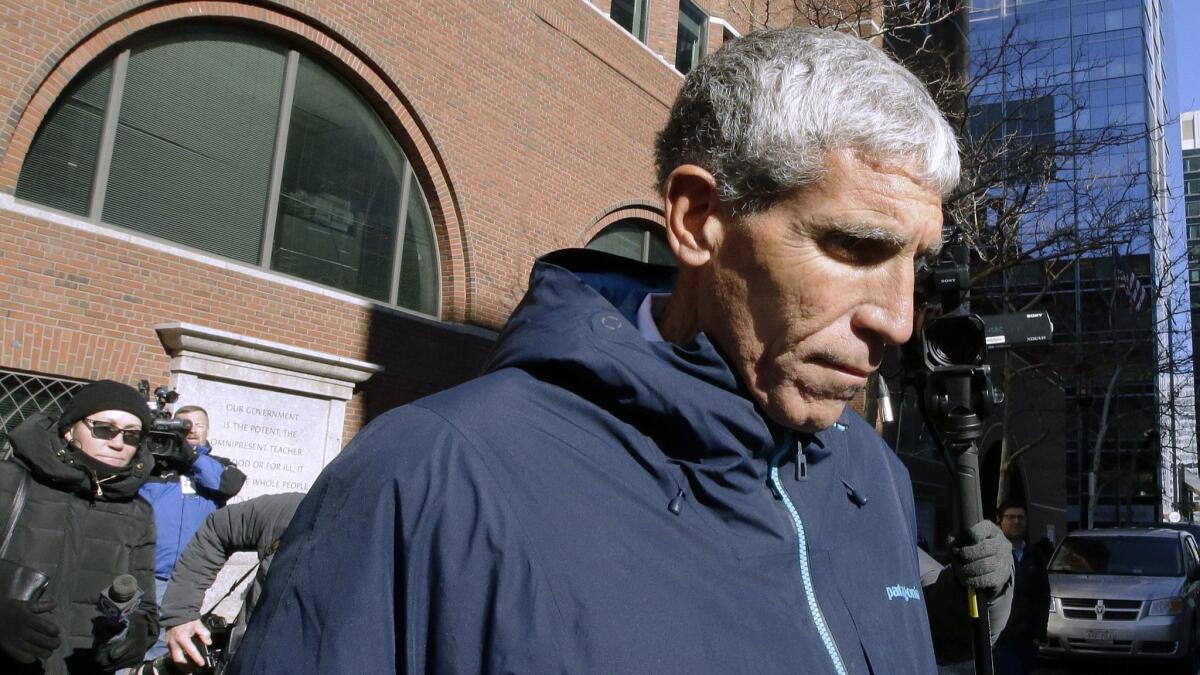Rick Singer explains his much-debated iPhone notes in college admissions scandal

- Share via
Several months into a legal dispute over his notes, William “Rick” Singer, the man at the center of the college admissions scandal, has offered his explanation for a series of iPhone missives he wrote while cooperating with an investigation into the money-for-admissions scam he perpetrated for a decade.
As he tried in October 2018 to elicit incriminating statements from his former clients in recorded phone calls, Singer wrote in a note, intended for his lawyer, that the federal agents overseeing his cooperation wanted him to “bend the truth” and “ask questions and retrieve responses that are not accurate.”
Attorneys for 14 parents who have pleaded not guilty to conspiring with Singer to commit fraud, bribery and money laundering have seized on the notes, accusing government authorities of browbeating Singer into following their theory — that payments they made to get their children into elite universities were bribes to corrupt employees, not legitimate donations to university accounts.
At his handlers’ direction, Singer fabricated evidence he knew to be inaccurate, the attorneys alleged in asking U.S. District Judge Nathaniel M. Gorton to dismiss the indictment. Currently, seven defendants — among them, Lori Loughlin, a television actress, and her husband, Mossimo Giannulli, a fashion designer — are scheduled to begin trial Oct. 5 in Boston. Another seven are slated for trial in January.
On April 17, Gorton told federal prosecutors in Boston to address in detail the “serious and disturbing” allegations raised in Singer’s notes. Prosecutors on Friday filed a report of an interview they conducted with Singer this week. He has pleaded guilty to four felonies and has yet to be sentenced.
Singer said he had resisted characterizing the payments as bribes because he hadn’t used the word before. “At the time,” the report said, “he never considered what he was doing was a bribe and he had several arguments with the agents over the word ‘bribe.’”
The first took place in September 2018, when three federal agents approached Singer in a room at a Marriott hotel in Boston. He agreed to cooperate but tried to play down his crimes, one of the agents, Elizabeth Keating, said in a sworn declaration filed in court Friday.
In the hotel room, Singer and the agents quarreled over precisely what prosecutors and defense attorneys are debating now. Singer called his clients’ payments “donations;” Keating told him a donation “was money provided as a gift, with no expectation of anything in return,” according to her declaration.
“I was more animated than usual,” said Keating, whom another agent described as normally soft-spoken, “because of Singer’s reluctance to accept responsibility for his crime.”
While he knew it was wrong to put forward an applicant with bogus athletic credentials, coupled with a six-figure payment to a university official or an account under his or her control, Singer didn’t believe at the time this amounted to a federal crime, according to the report of his interview. Prior to being apprehended and speaking with his attorney, Singer “didn’t understand the meaning of ‘quid pro quo.’”
“He thought he was doing something wrong but legal, but didn’t know for sure until his attorney explained that it was illegal,” the report said.
His handlers “didn’t do anything wrong,” Singer told prosecutors this week. “He and the agents had disagreements, but both needed to have a better understanding of where everyone was coming from.”
In declarations, Keating, an FBI agent and the lead prosecutor on the case, denied coercing Singer into lying or misleading the investigation’s targets.
The charged parents’ accusations of government misconduct are “repugnant and untrue,” Stephen Frank, who supervises the prosecutors assigned to the case, wrote in asking Gorton to deny the motion for dismissal.
More to Read
Sign up for Essential California
The most important California stories and recommendations in your inbox every morning.
You may occasionally receive promotional content from the Los Angeles Times.










